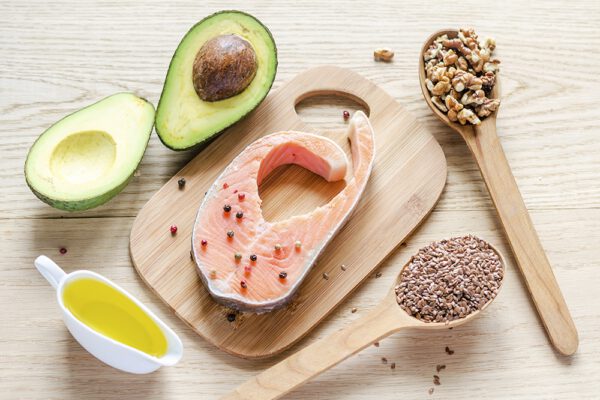What are the health and fitness benefits of Omega-3?
You may have seen or heard of Omega-6, or more likely, Omega-3 fatty acids. These days companies are trying to put them in everything, juice, butter, cereal... and it’s become even more popular lately as a supplement. They have so many benefits, it's hard to keep track. In this article we will explain the health and fitness benefits of Omega-3.
Omega-6 and Omega-3 are essential fatty acids that our body needs to function properly. More often than not, we get enough Omega-6, since there are plenty of foods that contain it, but we don’t get enough Omega-3. Most companies might say their products include Omega-3, but you are likely still not getting enough.
DHA, EPA and ALA.
DHA and EPA are found in certain fish and fish oils, whereas ALA is found in plant nuts and seeds. ALA is actually converted in our bodies to DHA and EPA, which are the source of all the benefits attached to ‘omega-3’. Unfortunately only a small amount of ALA is able to be converted, which is why you need to have fish sourced DHA and EPA in order to get the benefits. A lot of companies tend to put ALA Omega-3’s in their product, just so they can say they contain Omega-3.
Not to say ALA is bad, but DHA and EPA are simply better. This is why you likely don’t get enough Omega fats, and why supplementation can be important for your health and fitness.
They are found in certain kinds of fish:
- Salmon (Higher omega in wild salmon.)
- Wild Trout
- Herring
- Mackerel
- Sardines
- Anchovies
- Tuna
Any fish that are farm raised are likely to have higher levels of toxins like mercury, PCBs, ext. The safest option, especially for pregnant women and children, is to eat less fish and take fish oil supplements, or stick to wild salmon and trout, which tend to be the safest to consume in higher amounts.
It's found in nuts and seeds.
- Canola Oil
- Soy / Soybean Oil
- Walnuts
- Flaxseed/Flaxseed Oil
As I mentioned, Omegas are also available in supplement form. But when you’re at the store, possibly overwhelmed by the options for Omega related supplements, keep in mind that although there are plenty of options to choose from, to get the most bang for your buck ensure you get ~1000 mg of fish oil that contains EPA and DHA as the primary sources of omegas.
Although it may say to take anywhere from 1-4 tablets per day, the safest bet is to take two or maximum three tablets a day (~3000mg total). Depending on your circumstances, you may be able to, or be asked to take more, but rely on your doctor to make that call.
Omega-3 have so many benefits:
- Keeps your heart healthy and strong.
- Lowers cholesterol and triglyceride levels (fats circulating in the blood).
- Helps with joint pain and osteoporosis and can improve the effects of anti-inflammatory drugs.
- Also helps in other inflammatory-centered diseases like asthma, crohn's and irritable bowel disease..
- Helps with depression and can improve the effects of antidepressants.
- There is also some research saying that Omega-3 can help with ADHD, Asthma, dementia, Parkinson's and Alzheimer's disease.
Let’s recap what you just learned about Omega-3:
- Omega 6 and Omega-3 are essential fatty acids, and we do not get enough Omega-3.
- There are 3 types of Omega-3, DHA, EPA and ALA. All available in food and supplement form.
- DHA and EPA are the most important Omega-3’s, and are found in certain fish and fish oils.
- ALA is found in plant sources like nuts and seeds, and small amounts of it are transformed into DHA and EPA.
- DHA and EPA are the cause of countless benefits to our bodies!
Frequently Asked Questions
The main types of Omega-3 fatty acids are DHA, EPA, and ALA. DHA and EPA are primarily found in fish and fish oils, while ALA is found in plant sources like nuts and seeds. It is important to consume DHA and EPA for optimal health benefits.
Omega-3 fatty acids are essential for maintaining heart health, reducing inflammation, and supporting brain function. They are also beneficial for improving exercise performance and recovery, making them important for overall health and fitness.
Foods rich in Omega-3 EPA and DHA include fatty fish such as salmon, wild trout, herring, mackerel, sardines, anchovies, and tuna. These fish provide the most bioavailable forms of Omega-3.
While plant sources like flaxseed and walnuts contain ALA, which can convert to EPA and DHA, the conversion rate is low. To ensure adequate Omega-3 intake, consider consuming fish or fish oil supplements.
Omega-3 supplements can help fill dietary gaps, particularly if you don't consume enough fish. They support heart health, reduce inflammation, and may enhance exercise recovery. For more on supplements, check out The 5 Best Health Supplements: Benefits and Side Effects.
It is recommended to consume about 250-500 mg of combined EPA and DHA per day for adults. This can be achieved by eating fatty fish a few times a week or taking Omega-3 supplements.
Omega-3 supplements are generally safe, but high doses can lead to side effects like bleeding or interact with medications. It's best to consult with a healthcare provider before starting any supplement regimen.
